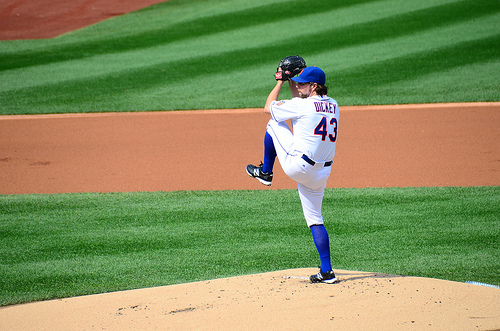We ought to consider R.A. Dickey, who’s now No. 1 in the Blue Jays’ starting rotation, not just a pitching asset but a cultural one. That isn’t because he’s a reader, though in one of many life crises he considered teaching high-school English. Nor that he’s a writer, with a bestseller: Wherever I Wind Up.
It’s because he’s a reflector: he reflects on what he lives, and reflects the results back to us. That’s what culture does. Creativity is less its essence, no one creates anything from scratch; that’s one of the myths of art. What artists make is reflections on reality, including reflections on the reflections of others.
His book’s subtitle is My Quest for Truth, Authenticity and the Perfect Knuckleball. (The fact it’s written, btw, with writer Wayne Coffey, detracts nothing; some great sports books, like Andre Agassi’s Open, were written “with.” The voice in the book is the same you hear in Dickey’s engrossing interviews.) What I found enthralling wasn’t the reveals of childhood sexual abuse, which are a small part and clearly not Dickey’s focus. Nor his journey with God, which is more what he centres on. For those outside the circle of faith, that’s hard to relate to — and I speak as someone who had lots of truck with Godtalk for a long period. The part I found riveting and revelatory is his road to the knuckleball.
That’s often the case with preternaturally gifted and thoughtful athletes: they can pull back the curtain into the sanctum sanctorum, the Holy of Holies (Dickey starts his book with a Latin motto: Dum spiro, spero. “While I breathe, I hope.”) They tell what they know. In his case the knuckleball unveils the purpose of his life: to be in the moment; to strive fervidly but then to accept. How so?
Most pitchers control: with strength, speed and, as they recount endlessly, location. Knuckleballers, who are tiny in number, do none of that. When those skills fail, they turn in desperation to the knuckleball, over which you surrender control. It floats slowly up to the plate and does what it does. Even the catcher gives up on providing a target, he rests his glove on his knee and waits to see what transpires.
Get the quality of it? It’s like submitting to the universe, to the Tao (which Dickey mentions). If you truly love something — set it free. It requires vast effort and, yes, faith, to reach this level of absence of control. In this way, through precise description of his paradoxical struggles to master the pitch, Dickey finds an effortless, accessible metaphor for his existential quest. It’s that pitch, versus abstract speculations, which carries you with him, deeper into life.
It makes Dickey the dialectical opposite of dominating Jays pitchers of the past, like Roger Clemens or Dave Stieb. Turning to the knuckleball is the result of humiliation and failure. It would be hard not to reflect on what brought you there. You wrestle with your inadequacy and transform it into a strength. Writing a book on it seems less surprising than inevitable. Plus, as Dickey says, he’s cursed with detail recall. I think one motive for writers is to try to empty their minds of all the stuff that lodges there and won’t go away. You gravitate into an examined life, which Socrates recommended and whom Dickey quotes.
In his Opening Day loss, Dickey watched a Cleveland homer drift over the right field wall. He practically stomped his foot on the mound, like a kid having a tantrum in his room. This, too, is one of the paradoxical blessings of pro sports, for he was then, as he yearns to be, in the moment. During a game, all monetary and other indirect considerations fade away — it they don’t, you’re in trouble. It’s like still being a child, when life was less mediated, except you’re not. And unlike other forms of mass culture, on the playing field you can’t fake it with formulaic novels or songs, or give heartless concerts and performances, because everyone knows the score. “I’m as good as my last game,” wrote Ken Dryden in his own self-searching book, “and no one can forget it.”
This article was first published in the Toronto Star.



